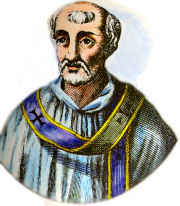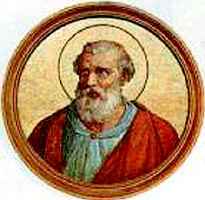|
Linus The authority of the Roman Catholic church is based entirely on its claim that the papacy represents an unbroken succession from St. Peter the Apostle to the current pope, John Paul II.
The authority of the Roman Catholic church is based entirely on its claim that the papacy represents an unbroken succession from St. Peter the Apostle to the current pope, John Paul II.There are numerous issues surrounding this claim, but perhaps the most important is that it hinges on two historical figures about whom virtually nothing is known—St. Linus, the second pope, and St. Cletus, the third pope. In the case of Cletus, even his name is a matter of dispute. Linus lived in the first century, became pope in 67 C.E. and died around 76 C.E. The first historical record that refers to Linus, purportedly the direct successor of Peter, was written in 189 C.E. This is a big, big problem. Why? Consider the following question, without resorting to Google: Who was Benjamin Harrison's vice president? For that matter, name any three historical facts about Benjamin Harrison himself. All right now, that was about 110 years ago, and the name of Levi P. Morton is enshrined in copious official records and history books. Harrison was president of the United States, for God's sake. And yet, our collective memory has already forgotten them both.
The sketchy traditions around the life of Linus are pretty sparse. He was believed to be an Italian from Tuscany, but his name is Greek, not Roman. It's vaguely believed that he was the same Linus who is the subject of a single glancing reference in one of Paul's letters in the New Testament, but even the church won't vouch for that as an unimpeachable fact. The first reference to Linus appears in the chronicles of Irenaeus, the infamous heresy hunter, whose mission in life was to consolidate the authority of the Roman church and squash what he viewed as inappropriate deviations from the teachings of Christ (such as Gnosticism). In other words, Irenaeus is not exactly an objective historian. His record of Linus was supposedly based on a list of the bishops of Rome. Irenaeus wrote:
After the Holy Apostles (Peter and Paul) had founded and set the Church in order (in Rome) they gave over the exercise of the episcopal office to Linus. The same Linus is mentioned by St. Paul in his Epistle to Timothy. His successor was Anacletus. You might want to read that paragraph a few times, because it's the entire basis of the authority of the Roman Catholic church. Without this paragraph, there is no legitimate historical record to support the key Catholic doctrine of the "apostolic succession," which states that Catholicism is the only true religion because it was directly handed down from the Apostle Peter, whom Jesus Christ supposedly selected to lead the church. Whether Jesus made any such selection is an entirely different can of worms which we'll reserve for another day, as well as the additional issue of whether being bishop of Rome inherently entitled anyone to the leadership of the entire Christian community. The point here is that the most important part of the apostolic succession—the part that actually connects to Peter—is unverifiable. The entire foundation of the apostolic succession is one paragraph written by a Roman Catholic propagandist more than 100 years after the fact. And Irenaeus tells us virtually nothing about what actually happened. How was Linus selected? How was the authority passed to him? Exactly what authority was passed to him? Was he empowered to choose his own successor? Did Linus consider himself infallible, as the popes who followed him would claim for themselves? Did he consider himself leader of all Christians or just the Romans? Did he wear a funny hat? Was he married (and there's no reason to think he wouldn't have been)? Had he been circumcised?
Interestingly, Catholic tradition calls him St. Cletus, which means that the Church didn't even trust Irenaeus to get his names straight. And the description by Irenaeus cited above is the only historical record of Anacletus, or Cletus, or whatever the hell his name was. He may also have been named Anencletus, and he might have been the fourth pope, rather than the third one. It's somewhat vaguely believed he was pope for between two and eight years before being martyred. You can probably see how there might be some room for error in here. There is absolutely no other tradition or history associated with Cletus. No one knows anything about him, not even the church. Except that Church doctrine, by implication, demands that he was the successor to Peter and that he passed that succession on to the next mainstream bishop of Rome. Over the course of centuries, a few traditional beliefs have developed about St. Linus, none of which have any historical veracity, but we'll include them for the sake of completeness. According to church tradition:
 Perhaps because of the dearth of verifiable information, no subsequent pope has ever taken on the name of Linus or Cletus. Indeed, few Catholics have ever even heard of them.
Perhaps because of the dearth of verifiable information, no subsequent pope has ever taken on the name of Linus or Cletus. Indeed, few Catholics have ever even heard of them. The first ever guy who can reasonably be considered an "official" pope (in the sense that his life and rank are documented at a time even remotely close to his lifetime) is Clement I. While Clement is pretty well documented and even left an epistle as evidence of his existence, there is still no absolute consensus about whether he was the third or fourth pope, which isn't exactly reassuring on the whole historical accuracy front.
|
 In 189 C.E., there were no printing presses, and literacy wasn't a given. The first written record concerning Linus arrived more than 100 years after the date that he died (we think). We can't even be sure that such a person existed, let alone be certain of the details of his life.
In 189 C.E., there were no printing presses, and literacy wasn't a given. The first written record concerning Linus arrived more than 100 years after the date that he died (we think). We can't even be sure that such a person existed, let alone be certain of the details of his life. 
 Another 100 years would pass before the next historically significant reference to the career of Linus in church annals. By the fourth century, the Church fathers were reduced to rank speculation about who this guy Linus was, and what he had to do with the church. Things were even worse when it came to the third pope, who may or may not have been named Anacletus.
Another 100 years would pass before the next historically significant reference to the career of Linus in church annals. By the fourth century, the Church fathers were reduced to rank speculation about who this guy Linus was, and what he had to do with the church. Things were even worse when it came to the third pope, who may or may not have been named Anacletus.